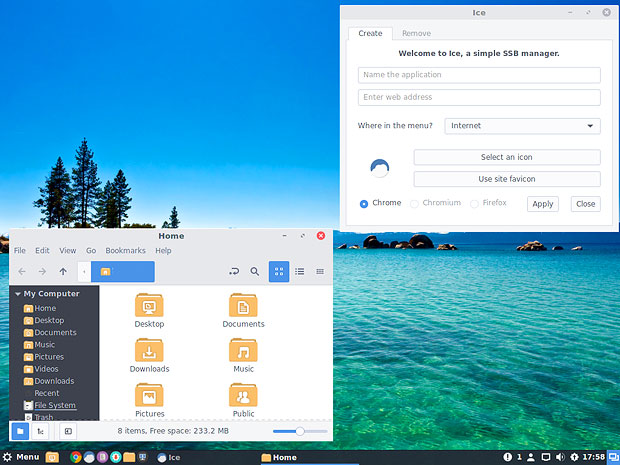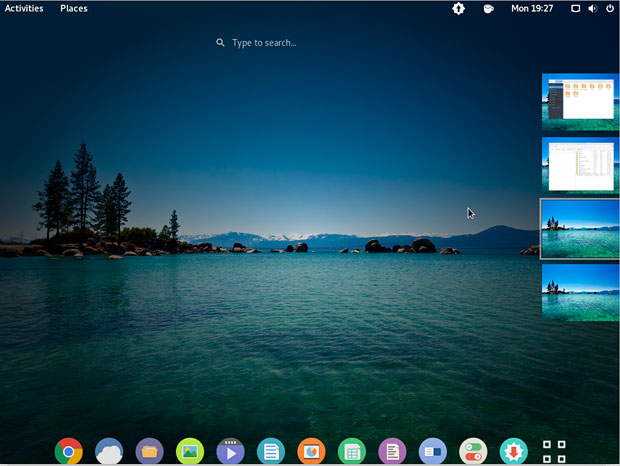
![]()
If you’re looking for a quick, clean and classy Linux distro, look no further than theApricity OS beta. Either of the two available flavors — GNOME or Cinnamon — is sure to give you a pleasant computing experience.
Apricity OS is an Arch Linux variant with rolling releases. The latest beta version was released last month. Betas can be frustrating to work with, and Arch Linux can be challenging, but Apricity’s developers did their jobs well to ease that pain.
My desktop preference falls to Cinnamon, so I spent most of my time putting the GNOME edition to the test, because I wanted something less familiar to me. Cinnamon is new to this beta cycle. I was curious to see if Apricity OS offered me a reason to dwell on GNOME.
GNOME is one of my least favorite desktop options. I was pleasantly surprised to discover that my disfavor for GNOME was mostly quelled by all the integrated niceties built into Apricity. Its GNOME desktop did not disappoint, thanks to the customized GNOME shell with many shell extensions preinstalled and enabled by default.
Catering to the Cloud
Regardless of your preference, Apricity OS takes an approach that most Linux distros ignore. It caters to the cloud generation of computing. It has an integrated software feature built around the site-specific browser manager ICE, which provides the ability to put your favorite Web apps on the desktop and access them simply.
This type of browser tool is not readily available through most distro repositories and the Synaptic Package Manager. The developers also incorporated software to minimize security risk.
Another reason for my newfound attraction to GNOME is its suitability for touch screen interfaces, so it was a perfect mate for a recently acquired laptop. The Cinnamon version appears to be somewhat more lightweight — another nice surprise.

Noteworthy Improvement
Apricity’s first public beta was GNOME, released last year. It developers follow a philosophy built on creating useful, intuitive software.
Arch-based Linux distros can be dogs to install and configure, but Apricity OS removes much of that anguish. The new version of Calamares, the installer, smoothed out the wrinkles in the installation fabric.
This expanded release maintained Apricity OS beta 1’s ability to use system resources minimally. The system memory requirement drops to 900 MB of RAM. That brings more access to less-endowed legacy hardware. The GNOME desktop environment, with its bare-bones basics, consumes as few resources as possible. It also provides much shorter boot times.
The latest release brings improvements to dozens of packages. It has better Google Drive support in the Nautilus file manager as well as new features in the Pamac package manager. The Totem movie player has support for more codecs.
The included Pushbullet support lets users send links and small files between desktops and laptops running Apricity and mobile devices, meaning Apricity users can receive mobile notifications, texts and phone calls across multiple devices.
Pushbullet plug-ins in certain Web browsers make this possible in other distros, but I rarely find PushBullet already active in the browser. Having the support included out of the box is just one more sign of greatness for the Apricity OS.
I suspect a good part of Apricity’s smooth operation is the integration of its own repositories to supplement Arch’s official software warehouse. Apricity comes with specific packages and prebuilt packages from the Arch User Repository or AUR.
Laptop users ill appreciate the longer untethered times the advanced battery management tool, TLP, achieves for optimizing battery usage. The Syncthing tool lets you transfer large amounts of data across multiple platforms through a fully encrypted system.
Other preinstalled niceties are the PlayOnLinux game platform, Steam for Linux, and a Wine front end for running Microsoft Windows apps and games.
More Good Stuff
The Apricity OS comes with specialized software to make an easier transition into Linux for newcomers. That approach makes switching to Apricity OS more convenient for users coming from other Linux distros as well.
For example, a better Google Chrome package is preinstalled. It is a much better version than the source package from the AUR. Marxico, a Markdown editor for Evernote, and the BitTorrent Sync GUI application are included.
Favorite apps vary as you move from distro to distro. For a beta newcomer, however, Apricity’s developers really make good on their quest to build a better distro. For instance, they included Sbackup, a fully functional system backup utility that supports compressed and uncompressed, scheduled, manual, remote and split backups. Add to that Liquid Prompt, a tool that improves usability for Bash and Zsh.
Look and Feel
A world of difference exists between Arch-based Linux distros and some of the types in the Slackware, Debian, Gentoo and other offshoots. Apricity OS minimizes those differences. It is a smart-looking, easy-to-use alternative to other distros.
One particularly nice alteration in appearance is the favorites bar. Most GNOME 3 iterations place the favorites bar along the left screen edge. Apricity OS takes a more traditional and functional approach by placing it across the bottom. This placement is more convenient for both input methods — mousing and touch screen.

GNOME uses a full-screen icon display rather than a pop-up two-column title index. The launch button for the display is on the far right end of the panel. It takes a right click or long press to add or remove icons.
A transparent panel sits across the top of the screen. The Activity button in the upper left corner exposes the virtual workplaces along the right edge of the screen. Next to the Activities button is the Places launcher.
A few basic system icons and a notification area reside at the right end of the panel. All told, the combination of appearance and functionality gives this distro a pleasant computing environment.
Bottom Line
Apricity OS targets newbies and professionals alike. It has a well-thought-out design. Its execution makes both the GNOME and the Cinnamon editions very functional.
The overall performance of the distro is impressive. I am looking forward to the release of the nonbeta version.
Apricity OS is a Linux distro that will make you rethink why you use your existing operating system. It is a distro worth checking out.
Want to Suggest a Review?
Is there a Linux software application or distro you’d like to suggest for review? Something you love or would like to get to know?
Pleaseemail your ideas to me, and I’ll consider them for a future Linux Picks and Pans column.
And use the Talkback feature below to add your comments!






















































I’d been a Debian-based user for ages, but when I started having overheating problems with my Sparky Linux install, I thought I’d give another OS a try.
I’d always been interested in Arch, but after a couple of failed install attempts a few years ago and the fact that I needed to get up and running fast, I decided to try an Arch-based distro with an easy installer. Hence Apricity OS. And I am pleased to report that I couldn’t be happier.
As I recall, only my printer didn’t work out-of-the-box, but everything else did, which is pretty amazing. And the printer issue was quickly rectified with the install of a package.
Clean, fast and good-looking — it’s well worth checking out.